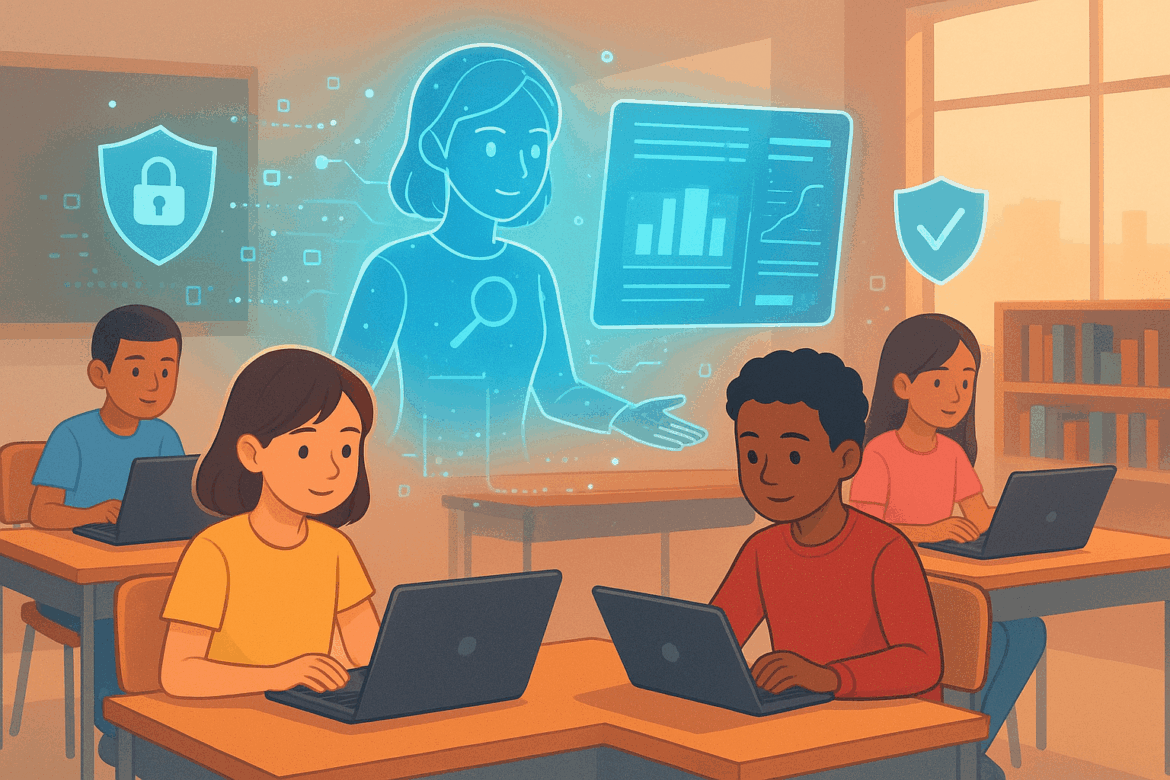Artificial Intelligence (AI) is transforming education in exciting ways. From personalized learning to smart tutoring systems, AI helps students learn better and makes teachers’ work easier. However, as schools adopt more AI tools, student privacy has become a major concern. This blog explores how AI is used in education, the privacy challenges it raises, and how schools can implement AI safely and ethically.
How Artificial Intelligence is Changing Education
AI is being applied in many areas of education to improve learning experiences.
Personalized Learning for Each Student
AI can analyze a student’s strengths, weaknesses, and learning style to create customized lessons. This helps students learn at their own pace and ensures they focus on areas where they need the most improvement.
Automated Grading and Feedback
AI can grade assignments and tests quickly and fairly. Teachers get more time to focus on teaching, while students receive instant feedback to help them improve faster.
Virtual Tutors and AI Assistants
Intelligent chatbots or virtual tutors can assist students with homework or learning new concepts at any time. This provides additional support outside classroom hours.
Predictive Insights for Student Success
AI can identify students who may be struggling or at risk of falling behind. Schools can then provide timely help and interventions to ensure better academic outcomes.
While these benefits are impressive, AI systems rely heavily on student data, which brings privacy concerns.
Understanding Privacy Concerns in AI for Education
AI in education collects a lot of sensitive information to work effectively. This includes:
- Personal details such as names, ages, and contact information
- Academic performance, grades, and test scores
- Learning behaviors and interaction patterns
These data collections can create privacy risks:
Potential Misuse of Data
If student data is shared improperly or stolen, it could be exploited or used for unintended purposes.
Lack of Transparency
Students and parents may not fully understand what data is being collected or how it is used.
Bias in AI Algorithms
If AI systems are trained on biased data, they can give unfair results or recommendations.
Third-Party Access Risks
Many AI tools are managed by external companies, which may increase the risk of data breaches if proper security measures are not in place.
Parents’ and Teachers’ Concerns About AI in Schools
Many parents are cautious about AI in schools. Recent surveys show that about 70% of parents oppose sharing student data with AI tools. Their main concerns include safety, fairness, and potential misuse of personal information.
Teachers also want to use AI to enhance learning but are concerned about maintaining privacy and ethical use of student data. Balancing the advantages of AI with these concerns is critical for safe adoption.
Steps Schools Can Take to Protect Student Privacy
Schools and AI providers can adopt several strategies to ensure data privacy:
Collect Only Necessary Data
AI systems should gather only the data needed for learning purposes, avoiding unnecessary personal information.
Transparency in Data Use
Schools should clearly explain to students and parents what data is collected, how it is stored, and how it will be used.
Secure Data Storage
Using encryption and strong cybersecurity practices helps prevent unauthorized access and data breaches.
Use Anonymized or Synthetic Data
AI models can be trained on fake or anonymized data to protect real student information while still delivering effective learning outcomes.
Compliance With Privacy Laws
Schools should follow regulations like GDPR or FERPA to ensure legal and ethical data handling.
Ethical Implementation of AI in Education
Protecting privacy is only part of the solution. Ethical AI ensures fairness and accountability in education:
Ensuring Fair Assessments
AI must provide unbiased results for all students, regardless of gender, race, or background.
Maintaining Human Oversight
Teachers should always be involved in decision-making to guide students and monitor AI outputs.
Regular Audits and Monitoring
AI systems should be reviewed regularly to detect errors, biases, or security risks.
Ethical implementation guarantees that AI enhances learning without compromising student safety or fairness.
Conclusion: Balancing AI Benefits with Privacy
AI can make education smarter, more personalized, and efficient. Students can enjoy tailored learning experiences, while teachers can focus more on teaching than administrative tasks. However, student privacy must remain a top priority.
By collecting only necessary data, using secure practices, following laws, and implementing ethical AI, schools can enjoy the benefits of AI while keeping students’ information safe. Ultimately, the goal is to balance innovation with responsibility, ensuring AI in education serves students effectively and securely.
